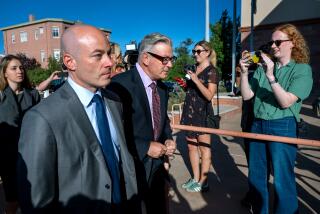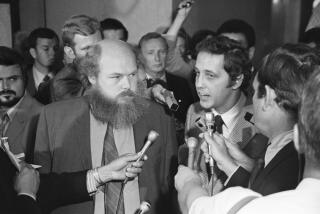Nevada courtroom drama begins
- Share via
RENO — The alleged killing was simple in its conception and its execution -- at least according to the prosecutor.
Chaz Higgs, 42, a Navy veteran and critical-care nurse, decided to end his three-year marriage to Nevada Controller Kathy Augustine last July by injecting the 50-year-old politician with a paralyzing drug, Deputy Dist. Atty. Christopher Hicks told jurors Tuesday during opening statements at Higgs’ murder trial.
“Chaz Higgs is a calculated murderer who used his trade to achieve his goal: getting rid of his wife,” Hicks said.
Augustine’s death last summer and Higgs’ prosecution have riveted the Nevada political world, where Augustine was known as a bare-knuckled politician who had just begun a comeback campaign for state treasurer two years after becoming the first state official in Nevada history to be impeached.
She had barely retained the elected controller’s position when the state Senate opted to reprimand rather than remove her for using state employees and equipment in her 2002 reelection campaign.
But the details of the murder case have grabbed the imaginations of people far outside Nevada politics. CBS’ “48 Hours” is filming the trial for a future segment.
Some of the drama derives from how the couple met. Higgs was part of the Las Vegas medical crew tending to Kathy Augustine’s then-husband, Charles, who had suffered a stroke in the summer of 2003. Charles Augustine died that August, and Higgs and Kathy Augustine married three weeks later in a surprise ceremony in Hawaii.
After Higgs was accused of his wife’s murder, speculation that he might have killed her previous husband led officials to exhume Charles Augustine’s body. Test results announced in May determined that he had died of natural causes.
But that did little to reduce the drama surrounding Kathy Augustine’s death, which authorities allege came after Higgs injected her with succinylcholine, or “succs,” a drug medical workers use to immobilize patients for insertion of breathing tubes. It can lead to suffocation while the patient remains conscious but incapable of reacting.
Augustine, who suffered severe brain damage, was disconnected from life support July 11, three days after Higgs called 911 to report that his wife was unconscious and barely breathing.
The motive, according to Hicks: love gone bad.
But defense attorney David Houston told jurors in his opening statement that Higgs had no reason to kill Augustine because he was already planning to leave her over her obsession with politics.
After the emotional turmoil of the impeachment, Augustine had promised Higgs, who was already contemplating divorce, that she would quit politics and they could leave the state for a fresh start, Houston said. But last summer she told Higgs she planned to run for state treasurer.
“She literally could not live without that world,” a world Higgs “could neither understand nor do well in,” Houston said. He added that Higgs came to the realization -- as do many lovers in relationships that end badly -- that Augustine couldn’t change.
“That doesn’t mean you hate them,” Houston said. “It certainly doesn’t mean you murder them.”
The opening statements took just over an hour in Washoe County District Judge Steven Kosach’s ornate courtroom. Its old-style high ceiling, mottled-gray marble wainscot and dark wood judge’s bench and jury box contrasted with the modern -- a large flat-screen monitor for displaying evidence, TV cameras in narrow wooden cases and a small satellite dish aimed out a window.
Higgs, free on $250,000 bail secured by his divorced parents’ East Coast homes, was behind the defense table before 8 a.m., an hour before court was to begin. He sat with his back to the gallery, turning only once to whisper a response to something a relative said as she walked behind him.
Higgs, with short-cropped hair and wearing a black suit, occasionally rested his chin on his hand or took notes as Hicks told the jurors they would hear testimony that Higgs had called Augustine “some very nasty names and he frequently ... spoke of his intent to get rid of her.”
Hicks also said there would be testimony that Higgs had spoken of using succs to kill someone because it was hard to detect.
Augustine had small amounts of the drug in her system when she died, and an autopsy found an unexplained puncture wound on the left buttock that was not part of the efforts to resuscitate her, Hicks said.
But Houston argued that Higgs had already taken steps to leave her, including setting up his own bank account and looking for an apartment. And if Higgs had injected her with the lethal drug, the former “battlefield medic” had the expertise to do it right -- not the way the prosecution maintains it was done.
Succinylcholine is usually administered intravenously so it is fast-acting, not in muscle or in the fatty layers below the skin, consistent with the mark on Augustine’s buttock. It was a distinction Higgs would know, Houston said.
And Higgs’ seeming detachment reported by emergency responders, he said, was simple “professionalism.” The full weight of Augustine’s death hit Higgs a few days later, Houston said, evidenced by a failed suicide attempt that included heavy drinking, pills, slashed wrists and a note that he planned to join his wife in death.
As Houston detailed the suicide attempt, a flush of red crept up the back of Higgs’ neck, and his ears turned crimson -- the only emotion he displayed.
In the end, Houston said, the jurors would have to apply their logic to the prosecution’s theory, and the witnesses’ testimony.
“Does it make sense?” Houston told the jurors to ask themselves. “Would someone do that?”
--
More to Read
Sign up for Essential California
The most important California stories and recommendations in your inbox every morning.
You may occasionally receive promotional content from the Los Angeles Times.











